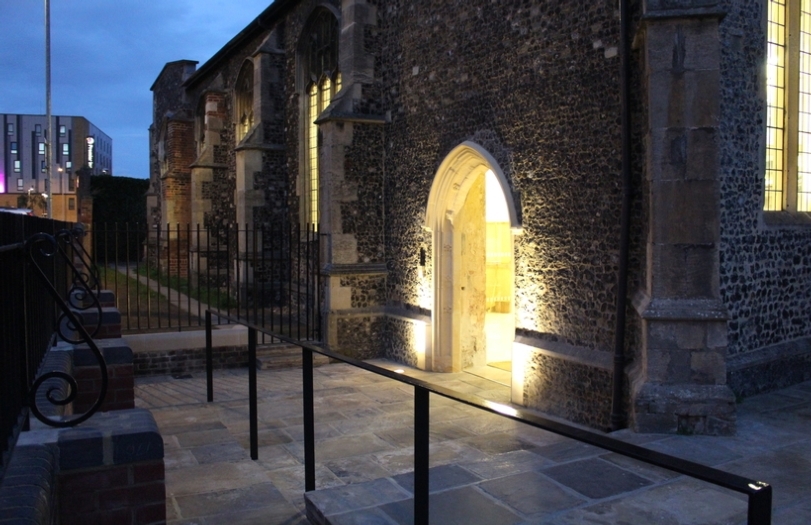Guest blog: The Relationship Between Heritage and Health
What’s heritage got to do with mental health?
Quite a lot, actually. We all have mental health, just as we have physical health and we can all look after our mental wellbeing, just as we can look after our bodies. Whereas eating five a day, getting a little exercise and sleeping well are all familiar elements in keeping physically fit, there are things we can do to look after our mental wellbeing too.
Quay Place
Our vision for Quay Place is for people to meet here, perhaps discover something they didn’t know – either about themselves or about the story of the church and the Ipswich waterfront – and maybe connect with something old or new.
We all have an emotional need for community and to feel part of something which is bigger than ourselves. The heritage of Quay Place enables that need to be met as we discover how we are all part of the larger story of St Mary-at-the-Quay, the docks and the rest of Ipswich.
Understanding the Connection
Our lives are intertwined with those of the people who came before us, even if we have only recently moved to the area or are just visiting. Just as we have physical needs for food, drink, sleep and movement, we have emotional needs too.
These can include:
- Security - a safe territory and an environment which allows us to develop fully.
- Attention - to give and receive it.
- A sense of autonomy and control - being able to make choices over our school, work or home life.
- Emotional connection - to know that at least one other person accepts us totally for who we are, “warts 'n' all”.
- Feeling part of a wider community - being part of something bigger than ourselves.
- Privacy - having the opportunity to reflect and consolidate experience.
- A sense of status and respect within social groupings.
- Feeling competent at something and enjoying a sense of achievement.
- Meaning and purpose - which comes from being stretched in our thoughts and actions.
If all our emotional needs are being met, we stand the best chance of remaining mentally healthy. If one or more of our emotional needs is not met, we are in danger of becoming stressed and if our stress is not addressed, we are likely to become mentally ill.
Just as nature has given us emotional needs which must be met, it has also given us innate resources – skills that we are born with and which develop as we grow – to help us meet our needs.
These include:
- The ability to develop complex long-term memory, which enables us to add to our innate knowledge and learn.
- The ability to build rapport, empathise and connect with others.
- Imagination, this enables us to; predict the future, focus our attention away from our emotions, use language and problem solve more creatively and objectively.
- Emotions and instincts.
- A conscious, rational mind that can check out our emotions, question, analyse and plan.
- The ability to 'know' — that is, to understand the world unconsciously through metaphorical pattern matching.
- An observing self - that part of us that can step back, be more objective and be aware of itself as a unique centre of awareness, apart from intellect, emotion and conditioning.
- A dreaming brain that defuses emotional expectations that were not acted out the previous day.
Quay Place and your Mental Wellbeing
At Quay Place we have used the heritage of the building, the surrounding area and the people that pepper the history of the church to come up with various ways in which you can meet your needs.
For example, our rope boards enable you to learn a new skill – tying fishermen’s knots – to stretch yourself and achieve something new.
You can gain more of an understanding of your place in the timeline of Ipswich and St Mary-at-the-Quay using our A-Z and the Time Table.
Get some privacy by sitting in the café and enjoy a drink or something to eat, or perhaps by sitting in the quiet sanctuary in the corner of the church.
And, of course, we want people to host training or business meetings in one of our meeting rooms to inspire the imagination of your guests in our uplifting environment.
What you can see today at Quay Place is just the beginning of our plans to support wellbeing through heritage. Each month we will focus on one of our emotional needs and plan activities accordingly.
This November is movement month – we have a physical need to move, not just to get exercise but also to burn off cortisol - the stress hormone, which plays a vital part in our mental wellbeing.
So now you have a reason to come to Quay Place every month - to find out what’s going on, and to learn about emotional needs and the link between heritage and wellbeing.
Jon Neal - Suffolk Mind
In March 2017, The Churches Conservation Trust, in partnership with Suffolk Mind and Future for Religious Heritage, are holding the Health and Heritage Conference. The event will explore the powerful relationship between mental health and wellbeing, and heritage, museums and the historic built environment.

